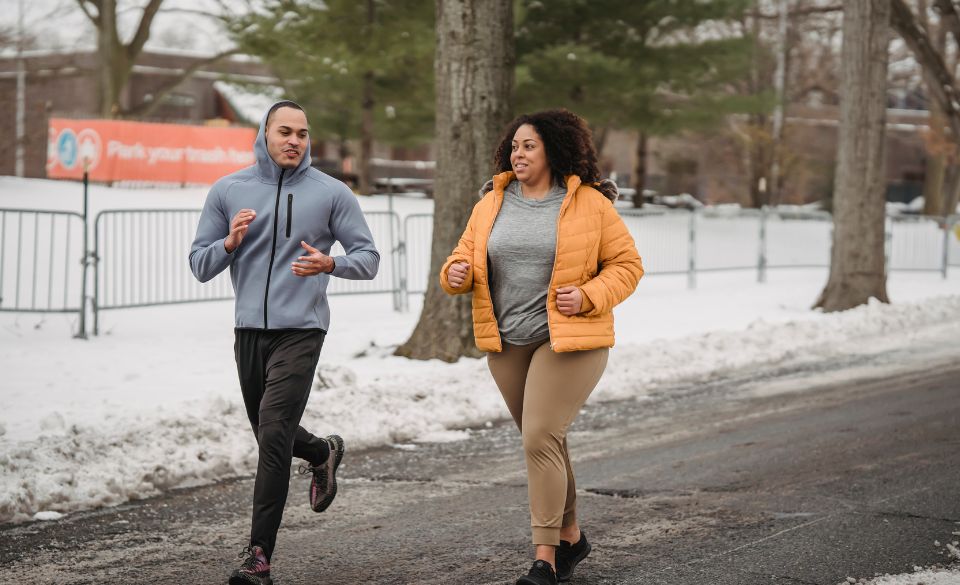
How Do I Find The Best Running Coach?
Page Contents
In a world flooded with training plans, running apps, and online resources, the idea of investing in a running coach might initially seem unnecessary. However, whether you’re a seasoned marathon enthusiast or lacing up for your inaugural mile, the personalized guidance from a coach can be a game-changer, elevating your performance and overall running experience.
Do You Need a Running Coach?
The advantages of having a running coach are multifaceted. If your aspirations involve covering more ground or increasing your pace, a coach becomes a strategic ally. They assist in goal setting and craft tailor-made training plans, ensuring you have the right blend of sessions and recovery periods for optimal fitness adaptations.
Your coach can design a personalized training plan that aligns with your lifestyle, aptitude, and fitness level, surpassing the generic templates found online or in books. When life throws curveballs like illness, injuries, or unforeseen commitments, a coach adapts your plan, keeping you on the trajectory toward your goals.
Beyond preventing burnout and injuries, coaches serve as motivators, offering encouragement during challenging sessions or races. If performance falls short, a coach analyzes, provides constructive feedback, and identifies areas for improvement. The regular interaction also combats the solitude often felt by long-distance runners, fostering a sense of community.
How a Running Coach Can Make a Difference
Personalized Training Plans: Coaches curate plans tailored to your needs, incorporating varied sessions and strategic rest periods for enhanced fitness and recovery.
Injury Prevention: Coaches ensure you strike the right balance between training intensity and recovery, minimizing the risk of injuries and burnout.
Motivation and Feedback: A coach acts as a consistent source of motivation, offering feedback on your progress, suggesting appropriate paces, and guiding you through the highs and lows of your running journey.
Lifestyle Analysis: If injuries persist, a coach delves into lifestyle factors, addressing issues like stress or insufficient sleep that might be impacting your running performance.
Confidence Building: Coaches instill confidence, helping you explore your full running potential and recognizing talents you may not have realized.
Choosing the Right Running Coach
When seeking a running coach, it’s crucial to prioritize knowledge and experience over fast race times. Request information on their qualifications, experience, and testimonials from previous clients. Current certifications include:
England Athletics Coach in Running Fitness (CiRF):
This qualification is recognized by England Athletics and focuses on coaching runners of all abilities. It covers topics such as training principles, session planning, and athlete development.
USA Track & Field (USATF) Coaching Certification:
Offered by the national governing body for track and field, this certification covers fundamental coaching principles, including biomechanics, physiology, and training theory.
Road Runners Club of America (RRCA) Level 1 Coaching Certification:
This certification focuses on coaching distance runners and covers areas such as training plans, injury prevention, and nutrition.
International Association of Athletics Federations (IAAF) Coaches Education and Certification System:
The IAAF offers coaching certifications at various levels, providing a global standard for coaching education in athletics, including running.
TrainingPeaks Certification:
While not specific to running, this certification focuses on using the TrainingPeaks platform for effective coaching, training plan development, and athlete management.
National Academy of Sports Medicine (NASM) Certified Nutrition Coach (CNC):
Understanding nutrition is a crucial aspect of coaching. This certification equips coaches with knowledge about nutrition principles and how to integrate them into training programs.
American Council on Exercise (ACE) Running Coach Certification:
ACE offers a specialized certification for running coaches, covering topics such as program design, injury prevention, and performance enhancement.
Chi Running Instructor Certification:
Chi Running focuses on a mindful and injury-free approach to running. Coaches with this certification are trained to teach the Chi Running technique.
Newton Running Form Coach Certification:
This certification focuses on teaching proper running form, helping coaches guide runners to improve their biomechanics and reduce the risk of injury.
Certified Personal Trainer (CPT):
While not specific to running, a general CPT certification from organizations like NASM, ACE, or ACSM indicates a foundational understanding of exercise science and training principles.
Sports Science or Related Degree:
Some coaches may hold degrees in sports science, kinesiology, exercise physiology, or a related field, providing them with a solid academic foundation in coaching principles.
Finding Your Running Coach
1. Running Clubs: Joining a running club provides access to coaches who offer guidance on technique, fitness, and endurance. Websites like RunTogether, JogScotland.org.uk, and Welshathletics.org help locate local running clubs.
2. Personal Trainers: If you’re looking to enhance strength and conditioning alongside running, a personal trainer can be a valuable addition. The National Register of Personal Trainers assists in finding qualified trainers.
3. Online Platforms: In the digital age, numerous online platforms connect aspiring runners with experienced coaches. Websites like TrainingPeaks, Strava, and CoachUp allow you to browse through profiles, reviews, and coaching philosophies to find the right fit for your running journey.
4. Local Running Events: Attend local running events or races, where coaches often volunteer or participate. Engaging with them in person provides a glimpse into their coaching style and allows you to assess if it resonates with your needs and preferences.
5. Running Specialty Stores: Check with your local running stores; they often have connections with the running community and may recommend reputable coaches. Some stores even host workshops or events where you can interact with coaches.
6. Social Media Communities: Joining running communities on platforms like Facebook, Instagram, or Reddit can unveil a wealth of insights. Fellow runners often share their experiences with coaches, offering valuable feedback and suggestions.
7. Athletic Clinics and Workshops: Many coaches conduct specialized clinics or workshops focusing on various aspects of running. Attending these sessions not only provides learning opportunities but also allows you to observe coaching styles firsthand.
8. University or College Running Programs: If you live in proximity to a university or college with a running program, explore the possibility of connecting with their coaches. Some programs extend their expertise to the local community.
Remember, finding the right running coach is a personal journey. Take the time to explore different options, ask questions, and ensure that the coaching philosophy aligns with your running goals and values. The right coach can transform your running experience, unlocking your full potential and making every stride a step closer to success.
Frequently Asked Questions (FAQ)
How Much Can I Charge as a Running Coach:
The fees charged by running coaches can vary based on factors such as experience, certifications, geographic location, and the level of personalized attention provided. On average, running coaches may charge anywhere from $50 to $150 per hour for individual sessions, and monthly coaching packages can range from $100 to $300 or more. Coaches with extensive experience or specialized certifications may command higher fees.
Is Paying for a Coach Worth It:
Paying for a coach can be worth it for many individuals, especially those seeking personalized guidance, structured training plans, and expert advice. A coach can provide tailored programs, regular feedback, motivation, and help prevent injuries. The value of coaching often extends beyond physical training, encompassing mental preparation, goal setting, and overall support, making it a worthwhile investment for those committed to reaching their running goals.
What Is a Good Price for a Coach:
A good price for a coach depends on various factors, including the coach’s qualifications, experience, services offered, and the level of personalization in the training programs. As a general guideline, individual coaching sessions may range from $50 to $150 per hour. Monthly coaching packages can vary from $100 to $300 or more, depending on the coach’s expertise and the comprehensiveness of the coaching services. It’s essential to consider your budget, training needs, and the value you place on the coaching services when determining what constitutes a “good” price for a coach.
Final Words – How Do I Find The Best Running Coach?
In a landscape saturated with training plans, running apps, and an abundance of online resources, the prospect of investing in a running coach may appear superfluous initially. However, whether you’re a seasoned marathoner or just stepping into the world of running, the personalized guidance from a coach can be a transformative force, enhancing your performance and overall running journey.
The advantages of having a running coach are myriad. Whether you aim to cover more ground or boost your pace, a coach becomes a strategic ally. They assist in goal setting and craft tailor-made training plans, ensuring the optimal blend of sessions and recovery periods for your fitness adaptations.
Your coach designs a personalized training plan aligned with your lifestyle, aptitude, and fitness level, surpassing generic templates found online or in books. When life throws curveballs like illness, injuries, or unforeseen commitments, a coach adapts your plan, keeping you on the trajectory toward your goals.
Beyond preventing burnout and injuries, coaches serve as motivators, offering encouragement during challenging sessions or races. If performance falls short, a coach analyzes, provides constructive feedback, and identifies areas for improvement. The regular interaction also combats the solitude often felt by long-distance runners, fostering a sense of community.


